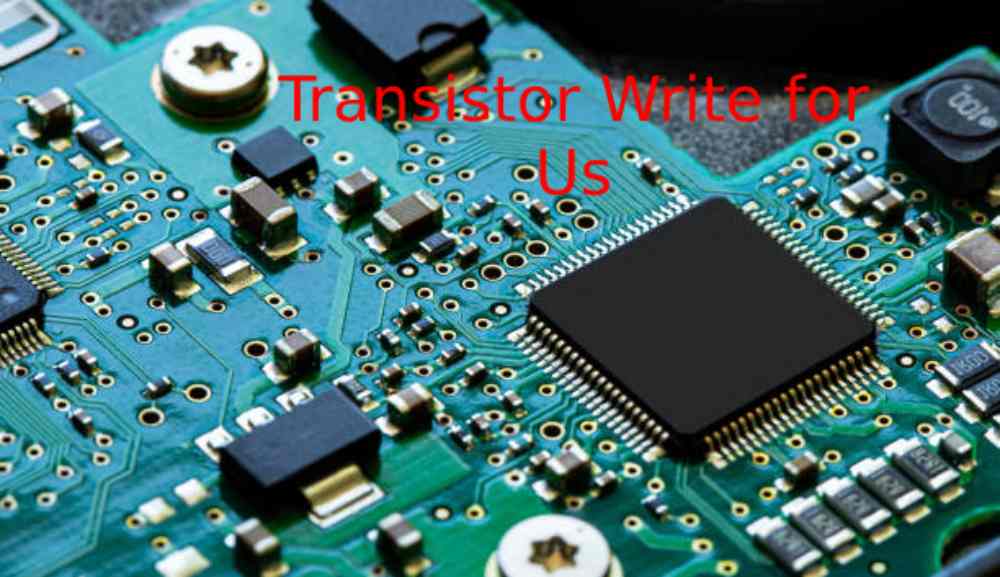Transistor Write for Us
A transistor is a semiconductor device that amplifies or changes electronic signals and electrical power. It consists of three layers of semiconductor material—two layers of one type (either N-type or P-type) sandwiched between a layer of the opposite kind.
The interaction between these layers allows a transistor to control the flow of electrical current.
Types of Transistors
Two main transistors exist: bipolar junction (BJT) and field-effect transistors (FET).
Bipolar Junction Transistors (BJT): BJTs have three layers: the emitter, base, and collector. There are two categories of BJTs, NPN, and PNP, depending on the arrangement of N-type and P-type layers. NPN transistors are more commonly use. BJTs amplify current and can also be use as switches in digital circuits.
Field-Effect Transistors (FET): FETs control the current flow using an electric field. They have three terminals: gate, source, and drain. Common FET types include MOSFETs (Metal-Oxide-Semiconductor FET) and JFETs (Junction Field-Effect Transistor). MOSFETs are widely use in digital circuits due to their low power consumption.
Transistor Operation
A transistor operates in three modes: cutoff, active, and saturation.
Cutoff: In this mode, the Transistor is turn off, and there is no current flow between the collector and emitter.
Active: In the active mode, the Transistor is partially on, and current flows between the collector and emitter. This mode is use for amplification.
Saturation: In saturation, the Transistor is fully turned on, allowing maximum current to flow between the collector and emitter. This mode is use for switching.
Applications of Transistors
Transistors are the foundation of modern electronics and have numerous applications:
Amplification: Transistors amplify weak signals in audio and radio-frequency applications.
Switching: Transistors act as switches in digital circuits, controlling the flow of current base on input signals.
Signal Processing: They are use in signal processing circuits, modulators, and demodulators.
Power Regulation: Transistors regulate voltage and current in power supplies and voltage regulators.
Digital Logic: They form the basis of digital logic gates in computers and microprocessors.
Memory: Transistors are use in memory cells in integrated circuits.
Radio Frequency (RF) Applications: They are crucial in RF amplifiers, oscillators, and mixers in wireless communication devices.
Audio Amplification: Transistors amplify audio signals in audio amplifiers and speakers.
Power Amplification: High-power transistors are use in amplifiers for audio systems and RF applications.
Light Emitting: Some transistors, such as light-emitting diodes (LEDs), are designed to emit light.
Moore’s Law and Miniaturization
Transistors have significantly shrunk in size over the years, in line with Moore’s Law, which predicted the doubling of transistors on a chip every two years. This miniaturization has led to more powerful and energy-efficient electronic devices.
Transistors are a cornerstone of modern technology, enabling the functionality of computers, smartphones, communication systems, medical devices, and much more. Their versatility and reliability have transformed the world of electronics and paved the way for technological advancements.
How to Update Your Articles?
Once your article is prepared, you could publish it to the journal. You can generally put up your document by using this email: contact@theslashgear.com
Why Write for theslashgear – Transistor Write for Us
- If you write to us, your commercial enterprise is centered, and the patron can study your article; you could have massive publicity.
- This will help construct relationships together with your beleaguered target audience.
- If you write for us, the discernibility of your brand and comprise worldly.
- Our presence is also on social media, and we percentage your article on social channels.
- You box the link lower back for your website inside the article, sharing search engine optimization costs with your internet site.
Search Terms Related to Transistor
Transistor
Bipolar junction transistor (BJT)
NPN transistor
PNP transistor
Field-effect transistor (FET)
MOSFET (Metal-Oxide-Semiconductor FET)
JFET (Junction Field-Effect Transistor)
Transistor operation modes
Transistor amplification
Transistor switching
Transistor applications
Transistor characteristics
Transistor types
Transistor symbol
Transistor configuration
Transistor biasing
Transistor circuits
Transistor gain
Transistor current flow
Transistor voltage regulation
Transistor logic gates
Transistor radio frequency (RF) applications
Transistor audio amplification
Transistor power amplification
Transistor memory cells
Transistor miniaturization
Moore’s Law and transistors
Transistor fabrication
Transistor technology advancements
Transistor history and evolution
Search Terms for Transistor Write for Us
Transistor Write for Us
Contribute to Transistor Technology Blog
Guest Posts on Semiconductor Devices
Write About Transistor Applications
Transistor Industry Guest Writers
Become a Transistor Technology Author
Transistor Insights Guest Blogging
Share Your Electronics Expertise
Guest Blogging Transistor Circuits
Write for Our Semiconductor Community
Transistor Amplification Writing Opportunities
Guest Author for Digital Electronics
Transistor Types and Characteristics
Transistor Fabrication Techniques
Write About Transistor Biasing
Guest Writing on Transistor Switching
RF Transistor Applications Insights
Guest Author for Electronics Engineering
Transistor Miniaturization Trends
Semiconductor Device Innovations
Article Guidelines on Theslashgear – Transistor Write for Us
- We at theslashgear welcome fresh and unique content related to Transistor.
- theslashgear allows a minimum of 500+ words related to Transistor.
- The editorial team of theslashgear does not encourage promotional content related to Transistor.
- For publishing an article at theslashgear, email us at contact@theslashgear.com
- theslashgear allows articles related to Tech, Al, Apps, Digital Marketing, and many more
- Link to a minimum of 5 write for our pages.

